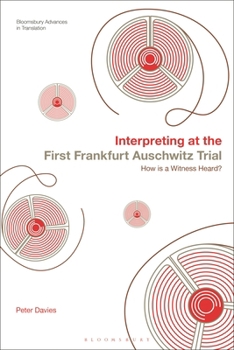Interpreting at the First Frankfurt Auschwitz Trial: How Is a Witness Heard?
This book explores the work of interpreters and translators at the First Frankfurt Auschwitz Trial of 22 former SS Auschwitz personnel in the mid-1960s, when the voices of dozens of witnesses, speaking 10 different languages, had a profound impact on public understanding of the Holocaust in Germany and beyond.
The book asks vital questions about how victims of genocide can make their voices heard in legal systems, and the processes by which the testimony of Holocaust survivors has entered the public record. The author discusses interpreters' professional practice and ethical self-understanding in the unequal linguistic and institutional structures of the courtroom, and shows how translation and interpreting affected the way victims' voices were heard.





